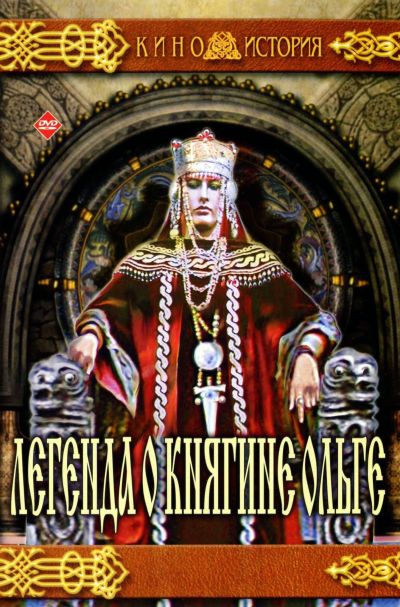★★
“Olga, Tigress of Siberia”
 While the film itself is not that good, it did introduce me to a new action heroine of history: Olga of Kiev, who seems to have been a serious bad-ass, even by the high standards of European bad-asses of the time. There’s some suggestion she was of Viking extraction, with her name originally Helga, and that would certainly make sense. She married Igor of Kiev around 903, and after his death, ruled the state of Kievan Rus’ for 18 years, in the name of her young son, Svyatoslav. The Russian Primary Chronicle recounts how Igor was killed by a neighbouring tribe, the Drevlians, and that’s where things kick off, because they then dispatched a delegation of 20 to pressure Olga into marrying their Prince Mal, so he would become the rule of Kievan Rus’. She had them buried alive, though sent word back that she accepted, only if the Drevlians sent their most distinguished men to accompany her on the journey to their land. Upon their arrival, she offered them a warm welcome and an invitation to clean up after their long journey. After they entered the bathhouse, she locked the doors and set fire to the building.
While the film itself is not that good, it did introduce me to a new action heroine of history: Olga of Kiev, who seems to have been a serious bad-ass, even by the high standards of European bad-asses of the time. There’s some suggestion she was of Viking extraction, with her name originally Helga, and that would certainly make sense. She married Igor of Kiev around 903, and after his death, ruled the state of Kievan Rus’ for 18 years, in the name of her young son, Svyatoslav. The Russian Primary Chronicle recounts how Igor was killed by a neighbouring tribe, the Drevlians, and that’s where things kick off, because they then dispatched a delegation of 20 to pressure Olga into marrying their Prince Mal, so he would become the rule of Kievan Rus’. She had them buried alive, though sent word back that she accepted, only if the Drevlians sent their most distinguished men to accompany her on the journey to their land. Upon their arrival, she offered them a warm welcome and an invitation to clean up after their long journey. After they entered the bathhouse, she locked the doors and set fire to the building.
Having disposed in one stroke of the Drevlian elite, she then invited the unwitting remainder to a funeral feast at the site of her husband’s grave so she could mourn him. That didn’t go quite as the guest planned either: “When the Derevlians were drunk, she bade her followers to fall upon them, and went about herself egging on her retinue to the massacre of the Derevlians. So they cut down five thousand of them; but Olga returned to Kiev and prepared an army to attack the survivors.” First, however, with the aid of some inflammatory pigeons, she set their city on fire. “The people fled from the city, and Olga ordered her soldiers to catch them. Thus she took the city and burned it, and captured the elders of the city. Some of the other captives she killed, while some she gave to others as slaves to her followers. The remnant she left to pay tribute.” She was also the first Rus’ ruler to be converted to Christianity, being baptized by Emperor Constantine VII, and in 1547 was canonized by the Orthodox Church, who proclaimed her “equal to the apostles,” one of only five women so honoured in the history of Christianity.
Hard for any film to portray a woman like that, and to be honest, this one doesn’t succeed. It’s an odd structure which is mostly told in double flashback, from the perspective of Olga’s grandson, Vladimir. On his death-bed, he’s trying to figure out the true nature of his late grandmother (Efimenko), and we then see him as a youth (Ivanov), asking a number of people about her. That includes a Greek scholar who recounts the bloody story above, but also his housekeeper mother, whose memories reveal a different side to Olga. That’s perhaps the film’s most interesting aspect, the problem of separating myth and legend from reality, when everyone has a viewpoint that shows a different aspect of a historical figure. However, the format keeps the film too distant, and I really wish it had focused more on Olga, rather than (the much less-interesting) Vladimir. While made in 1983, it also suffers from an extremely-stilted approach that feels a couple of decades earlier, and despite its potential, certainly falls short of doing its titular subject justice.
Dir: Yuri Ilyenko
Star: Lyudmila Efimenko, Les Serdyuk, Vanya Ivanov, Konstantin Stepankov




